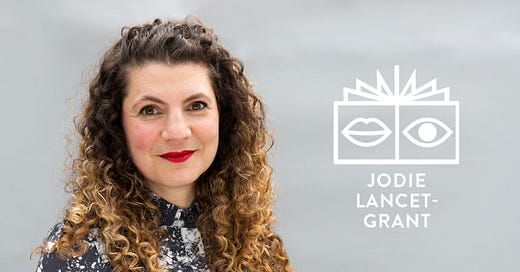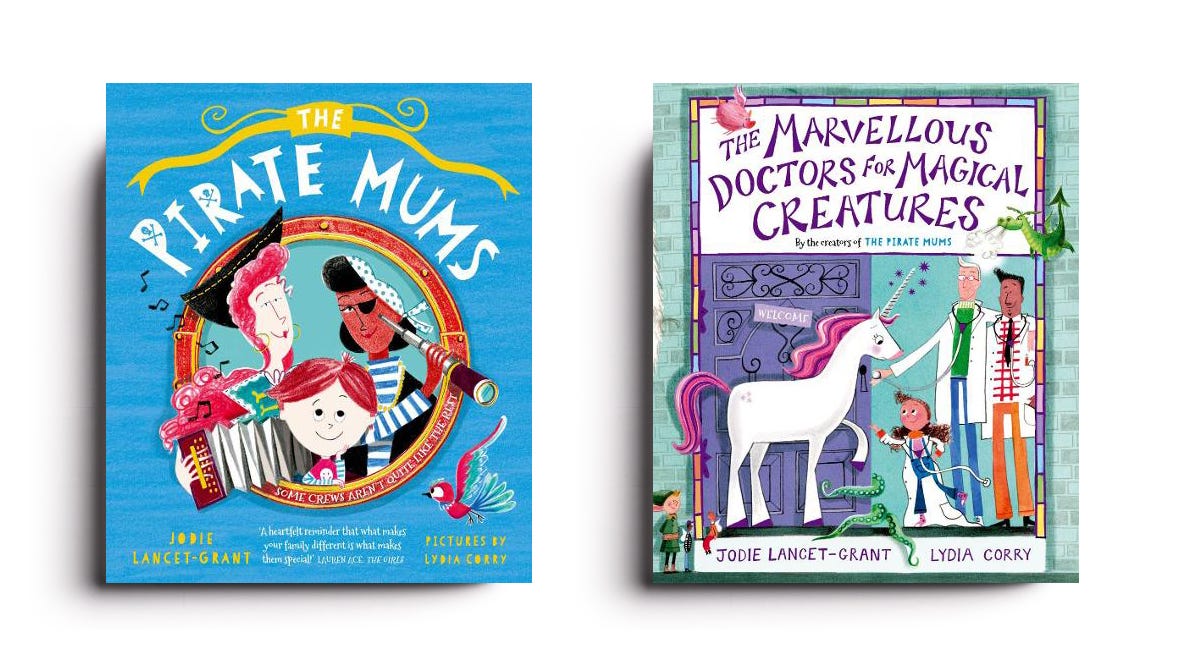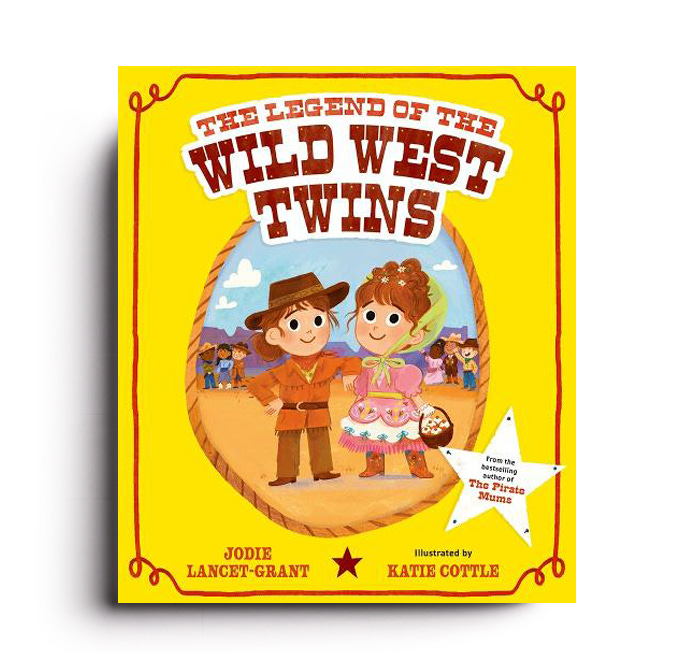Words and Pictures with Jodie Lancet-Grant
Discover the impact of LGBTQ+ inclusive books for children, how becoming an author made her a better publisher and her top tips for writers.
This week we’re joined by author and Associate Publisher Jodie Lancet-Grant.
We find out what inspired her to write LGBTQ+ inclusive books, the impact they have on families and how being an author helped her become a better publisher.
Jodie Lancet-Grant is an Associate Publisher at Bluebird at Pan Macmillan. She was previously Communications Director there and has also worked at Quarto and Penguin Random House.
Jodie also writes LGBTQ+ inclusive books for children. Her debut, The Pirate Mums, was the first ever book featuring a family with two mums to be read as a Cbeebies Bedtime Story.
She is also the Chair of Judges of the Children's and Young Adult category of the Polari Prize, the only award in the UK to recognise LGBTQ+ writing.
Why did you start writing for children?
When my twin daughters were three, they started to notice that our two-mum family wasn't the same as most other people's. Being a massive bibliophile, I immediately sought out some books that would reflect our lovely little LGBTQ+ family, to help them feel more seen.
But, to my surprise, I couldn't really find any; certainly very little at the level of the bestselling picture books from leading publishers - which I knew were bold, brazen, clever and often beautiful.
So after griping about this to my wife for a while, she encouraged me to write my own. I've always written on the side, whether as a freelance journalist or copywriting side hustle or working on one of the three terrible and now-abandoned novels I began in my twenties. So I decided to give this a go.
Can you tell us a little bit about your journey from first writing a story to getting published?
The first story I wrote actually didn't get published at all. It was about a little girl with two mums and magic wellies. It did get me an agent, though. I'd carefully gone through the Artists and Writers Yearbook and contacted every children's book agent in it. I was taken on by a lovely agent, and we met with a number of different publishers.
They all said they really liked my writing but the story wasn't quite there, and I didn't get a deal. I had, however, a great tip from one editor we met then, which sparked the idea for my first book The Pirate Mums.
Very frustratingly, my first agent actually quit the business, so it was back to the drawing board, and I was lucky enough to soon be signed by my current, very brilliant, agent.
How do you think your day job in publishing as an Associate Publisher at Pan Macmillan has impacted your children's writing career? Has knowing more about how publishing works helped? And if so, how?
Whilst I wasn't commissioning when I went out with my first book project - I was the Communications Director at Pan Mac adult imprint Bluebird, where I'm now Associate Publisher - I do think having a deep knowledge of the industry has helped.
My agent is someone I worked with in publishing many years ago - although we weren't in touch when I contacted her with the text for The Pirate Mums. I think it's been most useful, though, since, I've had a deal.
I understand the process and publishing jargon. I also have realistic expectations, which I think is something that many new authors find tricky. I basically know how small the budgets are!
But what I didn't really understand was how it feels to be an author - in particular the nerves. I really think that being an author has made me a much better publisher.
As well as an author and a publisher, you're also a judge for the Polari Prize which celebrates LBGQT+ writers. We think diversity and representation in children's books is incredibly important and would love to know more about what seeing more LBGQT+ writers and characters would have meant to you when you were growing up.
I grew up under Section 28, the law that forbid any mention of LGBTQ+ people from the classroom. I honestly thought that there simply weren't queer people in history! I still remember the joy of discovering Sarah Waters in my twenties, and her mission of writing LGBTQ+ people back into history through her amazing novels.
It would have meant a lot to have seen queer characters in the books I read back then - to know that this was completely normal. I think it would have been particularly important in the younger age group, to show LGBTQ+ families.
Even though I have been very lucky have had an extremely straightforward journey coming out as bi or pan, and have been supported all the way by family and friends, it hasn't always been easy to picture having a family.
Which isn't surprising when you think about how little representation there was - and in fact still is - of families like mine, although lots of us are trying to change that.
What are your favourite children's books?
Picture books: The Paper Dolls by Julia Dondaldson and Rebecca Cob (makes me cry every time) and The Wildest Cowboy by Garth Jennings (amazing rhymes, brilliant setting - definite inspiration for my book The Legend of the Wild West Twins.)
Middle grade: Queen Munch and Queen Nibble by Carol Ann Duffy, illustrated by Rebecca Cobb (beautiful, fun, queer-coded longer illustrated fairy tale); The Accidental Diaries of B.U.G by Jen Cairney (Funny, absorbing series featuring a kid with two mums. The fact she has two mums is totally incidental to the story, and so lovely); Otherland by Louie Stowell (before she conquered the world with her Loki books, Louie wrote this quirky and beautiful middle grade book about a quest and a fairy realm and I found it utterly beguiling.)
YA: The Simon Snow Trilogy - Carry On, Wayward Son, Any Way the Wind Blows by Rainbow Rowell (Honestly, don't get me started on these books, I could talk about them forever. Basically a queer, fan-fic take on Harry Potter but so perfectly rendered and imagined.)
What is the hardest part of being a children's author?
Finding time to actually be one! My day job takes up so much time that finding time to write - and promote, which, no matter what anyone says is a core part of the deal - is very difficult.
And what is the best bit?
There are so many. Seeing my stories in print. Meeting kids at school visits. I love doing literary festivals. But the biggest one is when I get messages from queer families to tell me how much my books mean to them.
Can you tell us anything about what you're working on now?
Yes! I'm working on a new picture book about a couple of highly unusual grannies. Themes are self-acceptance and the power of art to open minds...
I'd love to write something longer, and I have a well-fleshed-out but not actually written idea for a novel: two queer love stories, one set in 1917, one in 2017, with action moving between East London, Cornwall and the trenches of WW1. But, as one of my previous answers outlined, I don't know if I'll ever have time to actually try and write it!
Do you have any tips for anyone who might want to write their own picture book?
Read lots of picture books. The ones you remember from your own childhood are not the style that publishers are looking for now. And just get started. You can edit something rubbish and make it better but you can't improve something that doesn't exist.
You can find out more about Jodie on her website and Instagram.
Why subscribe to Words and Pictures?
We’ll share everything we know about making books and how the industry works in a new post each Monday.
Every month we’ll hold a live session for community members to ask us anything and everything they want to know about writing, illustrating and getting published.
There will also be free interviews every Friday with authors, illustrators and publishing professionals as they spill the ink about life behind the scenes making books.
Every month we’ll also highlight submission opportunities and exciting new releases in the world of children’s books.








